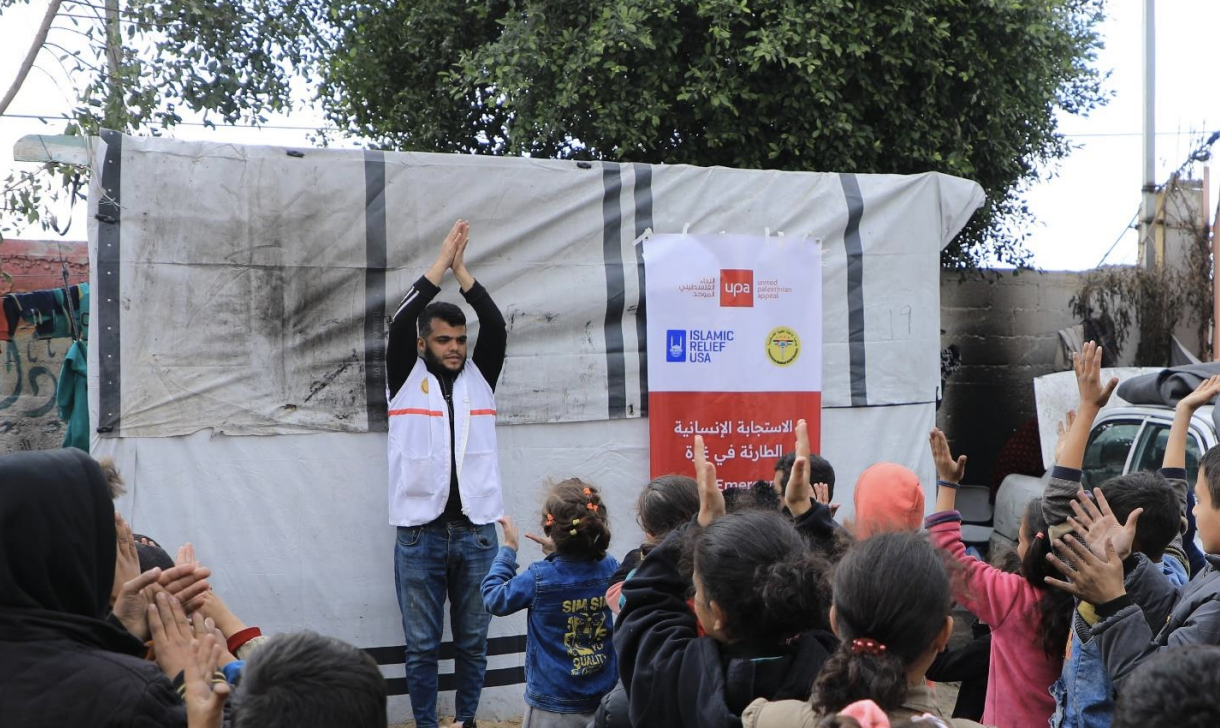by Zana Sahyouni, IRUSA Communications Specialist
Overview
On Saturday, October 7, 2023, violence escalated between Israel and Hamas, involving aerial, sea, and ground operations. The Gaza death toll has risen to more than 41,272 Palestinians amid Israel’s continued bombardment of the besieged enclave since October 7, including 16,756 children and 11,346 women, while another 95,551 have been injured. More than 10,000 people are missing with 69% of them being children and women. Among the dead were 172 journalists, 885 healthcare workers, 83 civil defense workers, 115 infants were born and killed during the war, and 36 died of malnutrition (Government Media Office).
Around 1.9 million people — 90% of the population — are now displaced from their homes, most of them having to move multiple times as nowhere is safe. 60% of homes and 68% of roads are damaged or destroyed, and more than half of hospitals and health facilities have been forced to shut down. 85% of schools have been bombed, hundreds of teachers killed, and 625,000 children have now been out of school for a whole year, with enormous implications for future generations. The relentless crisis is having a devastating psychological toll.
The violence between Israel and Hamas on October 7, 2023 has continued to escalate, and in September of 2024, violence between Israel Hezbollah, began. Israeli Ambassador Danny Danon says that Lebanon will “bear consequence” of Hezbollah’s “’mistake,” and that Israel is ready to intensify military action against Hezbollah. Since the beginning of the violence, there have been over 1,000 casualties, including Hezbollah leader Hassan Nasrallah and his family. The country estimates over 1 million are now internally displaced.
On September 29, nearly one year after the escalation of violence in Gaza, and the day after the Houthi Movement claimed to send a ballistic missile to Israel’s Ben Gurion International Airport, Israel fired airstrikes in Yemen’ Hodeidah and Ras Issa ports, attacking oil reserves and military supplies, and killing at least four civilians.
Violence has continued to escalate, and airstrikes between Iran and Israel are causing further instability in the region.
“Over the past year, we have seen international law violated regularly, with thousands of civilians killed and wounded, and starvation skyrocketing, as food is blocked from reaching children. Entire neighborhoods are now rubble, and schools, hospitals and religious sites have all come under unprecedented attack,” stated Islamic Relief USA CEO Ahmed Shehata.
Impact of the violence
“Every day I confront the same thing: due to the Israeli war on Gaza, children have lost all sense of calm. They have short fuses. They fight and push each other and struggle to take turns playing,” psychosocial worker for IRUSA’s Mobile Medical Team in Gaza shares.
“Some of them also frequently seem to zone out. This happens often when there is bombing around the area. The children get scared and they seem to leave their bodies and take their minds somewhere else. I try my best to return them to the present by continuing to play with them, returning them to the present by calling them “habibi” and using other similar endearments to help them get through those times.”
The Mobile Medical Team works to give these children in Gaza some sense of stability so they can minimize their mental suffering.
“All children want to play, to be happy. They rely on the adults around them to eliminate or at least mitigate their suffering. If we can’t reach them to provide that kind of comfort, I can imagine that their suffering increases greatly. Their mental health will suffer, and conditions such as worry, nervousness, and a continuous feeling of terror sets in,” he explained.
How IRUSA is Helping
Islamic Relief USA has been working in Palestine for decades. Our legacy across the country has grown to help hundreds of thousands of people every year. Not only do we provide immediate emergency relief, but we work with our partners to implement long-term development programs that will help rebuild Palestine and bring hope to its people.
While issues related to the delivery of humanitarian aid persist, IRUSA partners are continuing to work on the following interventions:
- Distribution of food parcels sourced by local farmers in Gaza to displaced families
- Provision of hygiene kits to people in shelters
- Provision of vital medical supplies to three hospitals including Hayfa Hospital, Al-Awda Hospital, and Al-Ahli Arab Hospital
- Access to mobile clinics for 23,400 people in shelters
- Immediate trauma response for 4,000–5,000 people
- Winter aid including essential non-food items such as blankets, mattresses, and winter clothing
Ceasefire Now
Outside of immediate relief to the region, IRUSAdvocates are working tirelessly to push for the flow of humanitarian aid and for a ceasefire. “As the crisis spreads, Islamic Relief continues to call for an immediate and lasting ceasefire across the region. International governments must demand an end to the escalations on civilians and violations of international law. We want to see a lasting peace where all civilians can live in safety and dignity, and have their same fundamental human rights upheld,” IRUSA CEO Ahmed Shehata stated.
A ceasefire is critical: “It is more important than ever to advocate for a permanent ceasefire and the flow of humanitarian aid. It is more important than ever that the Muslim American community, IRUSA supporters and humanitarians in the United States vote in this year’s election. Only through continued civic engagement that is insistent and persistent in its nature can change happen. Send the letters, make the calls and set up the meetings with your representatives. Don’t wait, the time is now” shared IRUSA Advocacy Manager, Aseel Elborno.
To help the people of Palestine, donate now.
